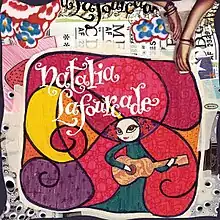| Natalia Lafourcade | ||||
|---|---|---|---|---|
 | ||||
| Studio album by | ||||
| Released | 8 July 2002 | |||
| Recorded | 2001–2002 | |||
| Genre | ||||
| Length | 50:19 | |||
| Language | Spanish | |||
| Label | Sony Mexico | |||
| Producer |
| |||
| Natalia Lafourcade chronology | ||||
| ||||
| Singles from Natalia Lafourcade | ||||
| ||||
| Review scores | |
|---|---|
| Source | Rating |
| AllMusic | |
Natalia Lafourcade is the debut studio album by Mexican singer-songwriter Natalia Lafourcade. It was released on 8 July 2002, via Sony Music Entertainment Mexico, with most of the songs written by Lafourcade herself and produced by Áureo Baqueiro and Loris Ceroni. The album is described as a blend of various musical styles, primarily Latin rock, Latin pop, and bossa nova.[2][1] Its tracks "Busca un problema" and "En el 2000" achieved commercial success in Mexico, with the latter being considered one of the most influential Spanish-language songs of the 2000s over the years. It was also featured in the soundtrack of the movie Amar te duele (2002). "Mírate, mírame" was also used in the soundtrack of the telenovela Clase 406 (2002).
The album reached the top of the Mexican Albums chart and received platinum certification from the Asociación Mexicana de Productores de Fonogramas y Videogramas (AMPROFON) for shipments of over 150,000 copies in Mexico. The album received two nominations at the 4th Annual Latin Grammy Awards, in the categories of Best New Artist and Best Rock Solo Vocal Album. It also received a nomination for Best Latin Pop Album at the 46th Annual Grammy Awards.
Accolades
| Awards | Category | Result | Ref. |
|---|---|---|---|
| 4th Latin Grammy Awards | Best Rock Solo Vocal Album | Nominated | [3] |
| Best New Artist | Nominated | ||
| 46th Grammy Awards | Best Latin Pop Album | Nominated | [4] |
Track listing
All tracks are written by Natalia Lafourcade, except where noted
| No. | Title | Writer(s) | Length |
|---|---|---|---|
| 1. | "Introducción" | 0:36 | |
| 2. | "Busca Un Problema" | 3:06 | |
| 3. | "En El 2000" | 3:35 | |
| 4. | "El Destino" | 3:04 | |
| 5. | "Mango" | 2:36 | |
| 6. | "Elefantes" | 4:09 | |
| 7. | "Otra Vez" |
| 3:45 |
| 8. | "Te Quiero Dar" | 4:24 | |
| 9. | "Georgina" | 3:57 | |
| 10. | "Mírame, Mírate" | Mauricio L. Arriaga | 3:58 |
| 11. | "Noche Divina" |
| 3:57 |
| 12. | "Mañana Olvidaré" | 4:15 | |
| 13. | "Mango" (Remix) | 4:49 | |
| 14. | "Elefantes" (Acústica) | 4:01 | |
| Total length: | 50:19 | ||
Charts
| Chart (2002) | Peak position |
|---|---|
| Mexican Albums (AMPROFON)[5] | 1 |
Certifications
| Region | Certification | Certified units/sales |
|---|---|---|
| Mexico (AMPROFON)[6] | Platinum | 150,000^ |
|
^ Shipments figures based on certification alone. | ||
References
- 1 2 Freeman, Phil. "Natalia Lafourcade – Natalia Lafourcade". AllMusic. Retrieved 31 March 2023.
- ↑ "Desde el 2000 hasta la raíz: la discografía de Natalia Lafourcade" [From 2000 to the roots: the discography of Natalia Lafourcade]. Rolling Stone (in Spanish). 9 November 2022. Retrieved 31 March 2023.
- ↑ "2003 Latin Grammys winners and the tribute to salsa queen". Top40-Charts.com. Retrieved 25 September 2022.
- ↑ "2003 GRAMMY WINNERS". www.grammy.com. Retrieved 25 September 2022.
- ↑ "Natalia Lafourcade". Universal Music Publishing Group. Retrieved 26 May 2023.
- ↑ "Certificaciones" (in Spanish). Asociación Mexicana de Productores de Fonogramas y Videogramas. Type Natalia Lafourcade in the box under the ARTISTA column heading and Natalia Lafourcade in the box under the TÍTULO column heading.